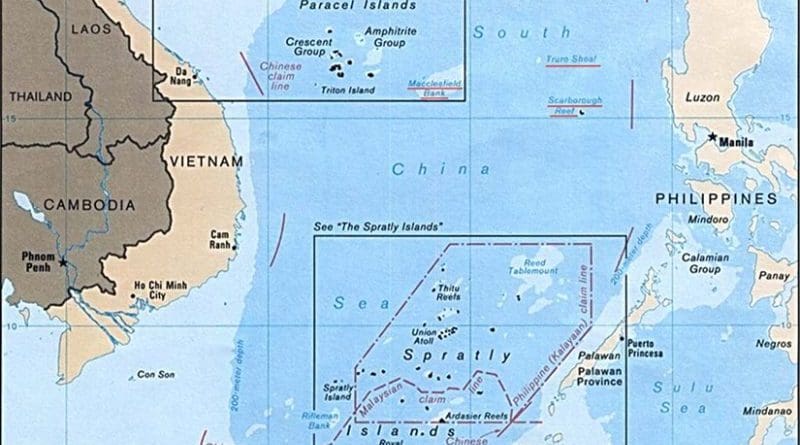Philippines: Lifting Of Moratorium Won’t Hinder Sea Exploration Projects With China
By BenarNews
By Aie Balagtas See
A Philippine decision to lift a moratorium on energy exploration in the South China Sea was a unilateral move but Chinese firms could still participate with Manila in extracting oil and gas resources in the disputed waterway, the country’s energy secretary said Friday.
Meanwhile, Beijing said it hoped to work with Manila to make additional headway on joint exploration projects in the sea region that were framed through a memorandum of understanding (MoU) signed between the two countries in 2018.
Lifting the 2014 moratorium was necessary because the country needed to ensure it had an independent energy source, Philippine Energy Secretary Alfonso Cusi said.
“There is no prohibition in [lifting the moratorium] unilaterally. What we have done is a unilateral action on our part to ask those licensees to restart activities in the West Philippine Sea,” Cusi said at a media briefing, using the Philippine name for the South China Sea.
“Chinese corporations and our licensees can still join together and participate in the development.”
President Rodrigo Duterte’s decision on Thursday to lift a 2014 moratorium came about a month after he strongly defended a 2016 international arbitration tribunal’s award that struck down virtually all of China’s claims in the disputed waters.
The Philippine decision to resume exploration on the South China Sea would not affect the 2018 memorandum with China, Cusi said.
In fact, it “will even help expedite the MoU,” he said.
The Philippines imposed the moratorium six years ago amid a territorial dispute with Beijing in the South China Sea. In 2016, an international tribunal verdict ruled in favor of Manila in the dispute.
The lifting of the moratorium will pave the way for the resumption of at least three projects, and the award of new service contracts, according to Cusi.
“We need to address our energy security. We need to harness the resources available in the West Philippine Sea. The president said this is for the future of our economy,” Cusi said.
He added that contractors had been given a “resume-to-work” notice to “begin addressing their investment commitment to explore the resources at the West Philippine Sea.”
2018 MoU
Responding to Duterte’s decision to lift the moratorium, Beijing’s foreign ministry spokesman, Zhao Lijian, said China wanted to join Manila in exploring energy projects in the region.
“China and the Philippines have reached [a] consensus on joint exploration of oil and gas resources in the South China Sea and set up relevant consultation and cooperation mechanisms,” Zhao told a daily briefing in Beijing on Friday, according to transcripts released by the Chinese Ministry of Foreign Affairs.
“We hope the two sides will work together for new progress in the joint exploration.”
Cusi said he was confident that Philippines could “do our activity freely as the country that has economic rights” over the areas of exploration. He was referring to the Philippines’ exclusive economic zone (EEZ) in the South China Sea.
The waterway can be “an oasis of peace where we should be able to do our exploration activities peacefully,” Cusi said.
Since being elected in 2016, Duterte has been moving closer to Washington’s rivals, Beijing and Moscow, a development that has not pleased everyone in the Philippines.
In 2018, when the two countries signed the oil and gas exploration MOU during a visit by Chinese Premier Xi Jinping, anti-China protestors took to the streets saying Duterte was “selling out the Philippines to China.”
“We are here to tell Xi that not all Filipinos are subservient to him like Duterte. Not all of us concede China’s possession of our waters, nor seek joint ownership and use of our exclusive economic zone,” said Neri Colmenares, one of the protest leaders.
Complete details of the MoU on oil and gas exploration were not released at the time it was signed in November 2018, but BenarNews saw a copy then. It stated that both countries had agreed to a sharing deal, under which the Philippines would get a 60 percent stake in resources extracted from the Reed Bank and China would get the remaining 40 percent.
Analysts said that joint exploration in the area would go against the Philippine constitution.
The Reed Bank lies within Manila’s EEZ, and is believed to sit atop vast untapped natural resources.
Apart from the Philippines, five other Asian governments – Brunei, Indonesia, Malaysia, Taiwan and Vietnam – have territorial claims or maritime boundaries in the South China Sea that overlap with China’s. While Indonesia does not regard itself as a party to the South China Sea dispute, Beijing claims historic rights to parts of the sea that overlap Indonesia’s exclusive economic zone.

